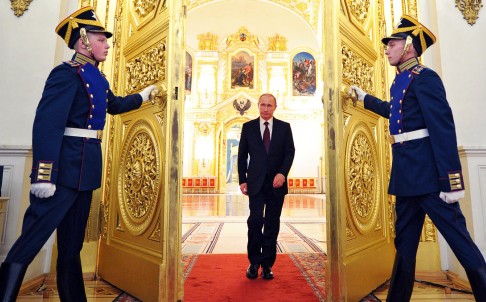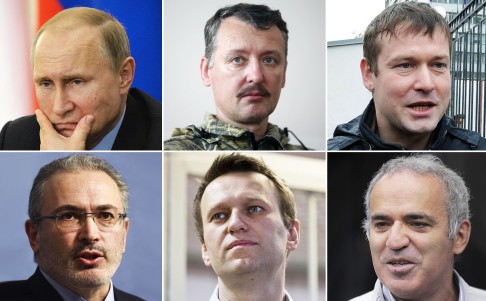With Nemtsov gone, Russian opposition wonders who is left to take on Vladimir Putin
With the opposition leader Nemtsov murdered and other high-profile dissenters in prison or exiled, voices railing at Kremlin now thinned
PUBLISHED : Monday, 02 March, 2015, 11:24pm
UPDATED : Monday, 02 March, 2015, 11:36pm
The Guardian in Moscow

Vladimir Putin arrives to meet officers in Ukraine. Photo: AFP
With the murder of Boris Nemtsov, Russia's beleaguered liberal opposition has lost one of its last audible voices.
Russia's parliament is dominated by the pro-Putin United Russia party but also has three parties nominally in opposition: Just Russia, the Liberal Democrats and the Communists. While these parties are given airtime on television and - especially in the case of the Communists - have a genuine electorate, they are best described as "systemic opposition", managed by the Kremlin.
Among the "non-systemic" opposition, there are few politicians who have much of a national profile, with the restrictions of state television meaning it is hard to gain a real platform. Harassment, threats and fatigue have led many into either jail or exile. Now that Nemtsov has been silenced, here are a list of the main opposition figureheads.
Mikhail Khodorkovsky: Once Russia's richest man, Khodorkovsky was jailed in 2003, on charges widely believed to be politically motivated after he began financing political parties. He spent a decade in jail but was released in December 2013 after Putin granted him amnesty.
Khodorkovsky was immediately flown to Berlin and now lives in Zurich. In December, he said he believes he will be arrested if he returns to Russia.
He has set up the Open Russia Foundation and said he is prepared to go "all the way" to change the regime in Russia. However, although Khodorkovsky may have impressed some with his stoical handling of a decade in prison, most Russians have little regard for those who made billions in the 1990s, and it is also unclear how much he can influence politics from outside the country.

Vladimir Putin (clockwise from top left) arrives to meet officers as Igor Strelkov leads pro-Russian forces in Ukraine. Leading opposition figures to Putin's government are Leonid Razvozzhaev, Mikhail Khodorkovsky, Alexei Navalny and Garry Kasparov. Photos: Agencies
Garry Kasparov: The former world chess champion became a fierce critic of Putin and was a frequent fixture at opposition events for many years, often being detained by police. In 2013, he announced at a press conference in Geneva that he had decided not to return to Russia, as after criminal charges were brought against Navalny and other opposition activists, he could be next.
Alexei Navalny: A blogger and lawyer who gained a huge following for his investigations into corruption among Putin's elite, Navalny came to prominence during the wave of street protests in Moscow at the end of 2011 and was widely seen as the brightest hope for the opposition.
While some are disturbed by his Russian nationalist views, others point out that they could help him gain broader support among Russians who would not normally support the opposition.
Since he came to prominence, Navalny has had to deal with a wave of bureaucratic and legal hassles, including two major court cases. At the end of last year, Navalny was given a suspended sentence in a fraud trial, but his brother was sentenced to three-and-a-half years in prison. Navalny says authorities have effectively taken his brother hostage in an attempt to stop him working, but he has vowed to continue.
Igor Strelkov: It has been suggested for a long time that the serious popular threat to Putin comes not from liberals but from nationalists, and these forces have been newly invigorated by the war in east Ukraine. Indeed, one theory is that rogue nationalist groups could be behind the killing of Nemtsov.
Strelkov, a fan of military re-enactments, fought for Russia in Chechnya and more recently helped coordinate the pro-Russian rebel movement in eastern Ukraine. Called back to Moscow after apparently going rogue, he has said he believes Russia will soon be engulfed by war.
The scenario seems unlikely, but there is no doubt that serious thought is being given as to whether the promotion of Russian nationalism in the armed conflict in Ukraine might have let a genie out of the bottle.
Sergei Udaltsov: A familiar face at opposition protests for years, 38-year-old Udaltsov is a hard-core radical leftist. He was charged as part of the "mass disturbances" case over a May 2012 rally that turned violent and was sentenced to four-and-a-half years in prison.
From jail, he has said that liberals and leftists must go separate ways now, due to their different positions on the conflict in Ukraine, and while he still opposes Putin, he calls for a new union of far-left forces.
